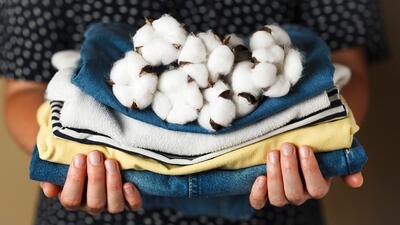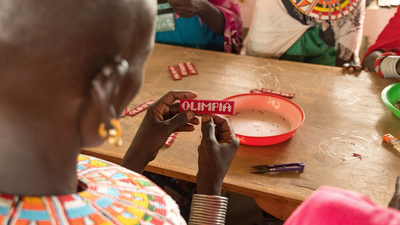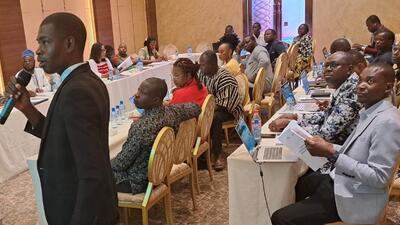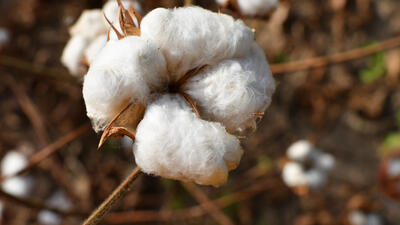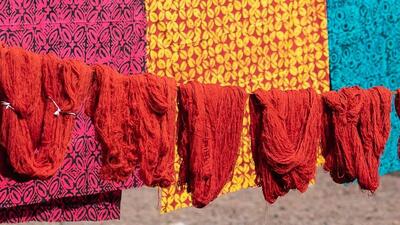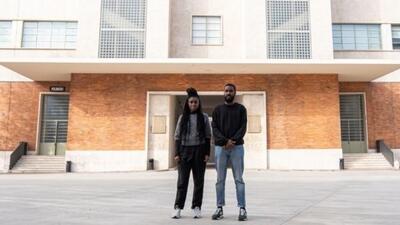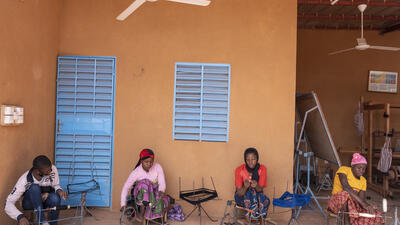
Minimizing cotton’s carbon footprint in Burkina Faso
Organic farming and sustainable production give cotton cooperatives a low environmental impact.
Since 2014, the International Trade Centre’s flagship Ethical Fashion Initiative has worked in Burkina Faso, Africa's largest cotton producer and exporter. CABES is EFI’s social enterprise partner based in Ouagadougou, with a network of 91 cooperatives and over 2,400 artisans weaving organic cotton into traditional West African textiles. Despite its large network of cotton producers and exporters, CABES's supply chain has a low carbon footprint.
Cotton’s carbon footprint varies greatly, depending on the variety of cotton, the location, natural conditions, and the cultivation systems. Cotton grown conventionally uses a lot of water, energy, and chemicals, resulting in high greenhouse gas emissions. Organic cotton avoids toxic chemicals and relies on rainwater. Organic cotton has slightly lower yields, but because input costs are significantly lower, the profit margins are better.
To gather data on sustainability, ITC asked myclimate to find out the carbon footprint of CABES cotton cooperatives. From cultivation to packaging, the study looked at all parts of the cotton supply chain to evaluate overall performance and areas of improvement. What they found was that in 2021, CABES cotton resulted in the emission of 7.58 kg of CO2 per kilogramme of fabric — about two-thirds less than the greenhouse gasses produced by industrial textiles.
CABES cooperatives in Burkina Faso prioritize sustainability. By shunning pesticides and chemicals, their organic farming reduces the risk of water contamination and poisoning. With rainfed watering techniques, they don’t need irrigation, which minimizes water usage. They use either natural dyes or reactive dyes certified to the Global Organic Textile Standard (GOTS), fully compliant with international environmental standards. In addition, they’re planning a dyeing facility complete with water treatment system.
CABES works closely with farmers in Burkina Faso to source locally grown organic cotton to produce high-quality export textiles. Typically, the cultivation, yarn production, and fabric production stages cause major carbon emissions, due to the frequent use of mechanical energy for large-scale production systems. But the cooperative’s organic smallholder farms avoid large machinery and mostly rely on manual labour to reduce their environmental impact.
Every skein of yarn produced by CABES cooperatives is hand-spun and then meticulously handwoven into high-quality textiles. Picking, spinning, and weaving cotton fibres by hand reduces electricity consumption.
Social sustainability is equally important to the cooperative. CABES was created to make a positive difference in the world. They aspire to provide meaningful work for community networks, including marginalized groups who live in areas impacted by climate change, insecurity, and migration. The Ethical Fashion Initiative code of conduct is incorporated into all CABES’s workshops. Their team of social workers collaborate with local organizations to assess their work and ensure that it’s improving people's lives.
For CABES, sustainability is a continuous journey, and their next goal in their green transition involves the installation of solar panels. ITC is dedicated to supporting ecopreneurs and micro, small, and medium-sized enterprises in their green innovations. By providing resources and guidance, ITC is helping them become more competitive in the marketplace.
About the programme
For the Ethical Fashion Initiative, lifestyle choices impact livelihoods. EFI creates and strengthens social enterprises in emerging economies, connecting discerning international brands in fashion, interiors, fine foods and the arts with talented local artists, designers, artisans, and micro-producers. Savvy investors, pro-poor champions, and mindful consumers find value in a virtuous circle that creates not just premium products, but also stable, dignified work, and creative and resilient women, men and communities.








